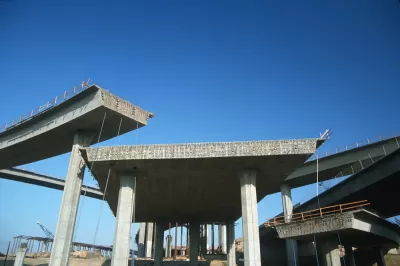The Federal Highway Administration is urging states to prioritize climate-friendly projects and put federal funds toward repairs and active transportation infrastructure.

Although the Senate removed provisions proposed in the House version of the infrastructure bill that would have required local governments to prioritize climate resilience and maintenance of existing infrastructure when it comes to transportation projects, the Federal Highway Administration issued a memo that urges its staff to promote climate-friendly projects and encourage building new highways only as a last resort. According to an article by Aarian Marshall, this gentle approach could still have some impact as state and local officials decide how to allocate federal funding.
Marshall notes that a similar approach has made a difference in Colorado, where the state encourages 'people-friendly' infrastructure projects that focus on maintenance and safety. Consequently, "an expansion project on Interstate 70 will include a new van shuttle system that could grow bigger with demand."
Environmental advocates have expressed disappointment at the 'toothless' language around climate change and road safety in the bill, which still allocates 80 percent of funding to roads and only 20 percent to transit. But recent developments, such as a proposed rule for revising emissions measurements and the FHA's decision to halt progress on a controversial freeway widening project in Houston, signal that, at the very least, "the administration has managed to spark conversation about the effects of highway construction on the communities that surround them, and on the planet."
FULL STORY: The US Is Gently Discouraging States From Building New Highways

Maui's Vacation Rental Debate Turns Ugly
Verbal attacks, misinformation campaigns and fistfights plague a high-stakes debate to convert thousands of vacation rentals into long-term housing.

Planetizen Federal Action Tracker
A weekly monitor of how Trump’s orders and actions are impacting planners and planning in America.

In Urban Planning, AI Prompting Could be the New Design Thinking
Creativity has long been key to great urban design. What if we see AI as our new creative partner?

Pedestrian Deaths Drop, Remain Twice as High as in 2009
Fatalities declined by 4 percent in 2024, but the U.S. is still nowhere close to ‘Vision Zero.’

King County Supportive Housing Program Offers Hope for Unhoused Residents
The county is taking a ‘Housing First’ approach that prioritizes getting people into housing, then offering wraparound supportive services.

Researchers Use AI to Get Clearer Picture of US Housing
Analysts are using artificial intelligence to supercharge their research by allowing them to comb through data faster. Though these AI tools can be error prone, they save time and housing researchers are optimistic about the future.
Urban Design for Planners 1: Software Tools
This six-course series explores essential urban design concepts using open source software and equips planners with the tools they need to participate fully in the urban design process.
Planning for Universal Design
Learn the tools for implementing Universal Design in planning regulations.
planning NEXT
Appalachian Highlands Housing Partners
Mpact (founded as Rail~Volution)
City of Camden Redevelopment Agency
City of Astoria
City of Portland
City of Laramie





























